Core Group of Experts
Nicol Voermans (Chair)
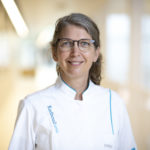
I am a neuromuscular neurologist working at the Radboudumc in Nijmegen with more than 15 years of clinical and research experience. My main fields of research are: 1) Faciocapulohumeral dystrophy (FSHD): genotype – phenotype coupling, trial readiness, optimal symptomatic treatment and trial fitness, and clinical trials; and 2) Congenital myopathies: genotype – phenotype coupling, trial readiness, optimal symptomatic treatment and trial fitness, and clinical trials. My research groups collaborates with various excellent researchers, among whom are Prof. Jungbluth in London and Prof. Treves in Basel. In 2021, I have launched the FSHD European Trial Network, bringing together all researchers and clinicians involved with FSHD in Europe.
Pascal Laforet (Vice chair)
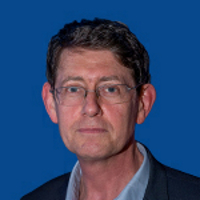
Pascal Laforêt, MD, PhD, is a professor of Neurology at the Versailles-Saint Quentin University, consultant specialized in neuromuscular disorders (myasthenia gravis, muscular dystrophies, and metabolic myopathies) in the Neurology department of Raymond-Poincaré hospital, and coordinator of North/East/Ile de France neuromuscular center and FHU Phenix dedicated to translational research in neuromuscular disorders. He is affiliated to U1179 INSERM-UVSQ laboratory, dedicated to biotherapies of neuromuscular system diseases. Major focus of his research activities are metabolic myopathies (pathophysiology and clinical trials), and he coordinates the French registries for mitochondrial disorders, glycogenosis type III, and Pompe disease. He is a member of the French Myology Society (SFM), French Society of Inherited Metabolic Disorders (SFEIM), and boards of the French Glycogenosis Association (AFG) and Garches Fundation.
George W. Padberg

George W. Padberg MD, PhD is a clinical neurologist with special interest in Neuromuscular Diseases and Genetics. His medical training was at the University of Leiden, The Netherlands and his specialist training in Houston and Amsterdam. In 1982 he wrote a thesis on Facioscapulohumeral Disease. He worked in the Neurology staff in the Leiden University Medical Center and was appointed professor and chairman of the Department of Neurology at the Radboud University Medical Center in Nijmegen in 1993. He retired in 2013 and is currently involved in various organizations for research and care for FSHD.
Karlien Mul
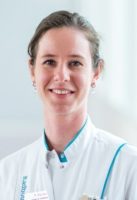
Dr. Mul works as an MD at the Neurology department of the Radboud University Medical Center, Nijmegen, the Netherlands. Since 2013 she is actively involved in facioscapulohumeral muscular dystrophy (FSHD) research and initiated a large observational cohort study including over 200 FSHD patients. Her main research interests are phenotype-genotype relations, muscle imaging biomarkers and the development of clinical outcome measures. She successfully defended her PhD thesis on FSHD at the beginning of 2018 and now supervises various clinical studies on this disease.
Alexandre Méjat
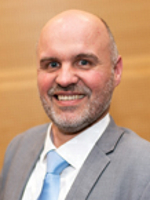
Being both a patient affected by a neuromuscular disease and a PhD in molecular and cellular biology, Alexandre Méjat is International Scientific Affairs manager in the scientific department of AFM-Telethon. He is an elected member of the Board of directors of EURORDIS and Vice-Chair of the European NeuroMuscular Center (ENMC). He also represents AFM-Telethon in several international scientific networks such as IRDiRC, the EJP-RD and the ERN EuroNMD. Finally, he accompanies AFM-Telethon patient representatives in international and European federations such as World Duchenne Organization, SMA-Europe, Euro-DyMA and FSHD Europe.
Shahram Attarian
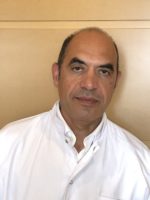
I am an adult neurologist, head of the department of neuromuscular disorders and ALS in Timone Hospital University in Marseille and Professor of Neurology at the Faculty of Medicine of Aix-Marseille. My center is labeled a reference center by the French ministry and is European Reference Network center. In the last two years I coordinated the French Rare Health Care for Neuromuscular Diseases Network (FILNMUS).
My main research topics are the development of biomarkers and new therapeutic strategies in neuromuscular disorders (FSHD, CMT). I am coordinator of 2 international therapeutic trials (CMT and GBS) and PI of more than 60 therapeutic trials in neuromuscular disorders and ALS.
I am a member of the scientific committee of EJP-RD for neuromuscular disorders and vice-president of the AFM-Téléthon’s medical scientific council, president of medical scientific council of the French CMT patient association.
Robert-Yves Carlier
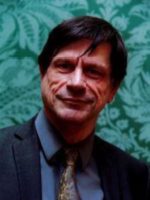
Hospital practitioner in the medical imaging department, teaching Hospital R Poincaré, since 1995.
Head of the department 09/2012
Head of the medical imaging department University Hospital Group Paris Ile-de-France Ouest, Hospitals Raymond Poincaré, Ambroise Paré and Sainte Périne(GHU PIFO).
Head of the medical imaging department Hôpital Intercommunal Poissy/Saint-Germain
President of the hospital spine multidisciplinary group (Groupe Rachis Garches)
Specialized in clinical and interventional imaging of the disabled patient
Expert in muscle MRI and spine diagnostic and interventional imaging
Giorgio Tasca
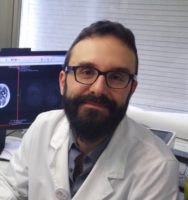
Giorgio is Professor of Neuromuscular Science at the John Walton Muscular Dystrophy Research Centre, Newcastle University, UK. He is an adult neurologist and completed a PhD in Neuroscience in 2014 at the Catholic University School of Medicine in Rome. In 2012-2013 he was research fellow at the Folkhälsan Institute of Genetics, Helsinki and at the Neuromuscular Research Center, Tampere University, Finland, under the supervision of Prof. Bjarne Udd, and later at the Unit of Neuromuscular and Neurodegenerative Disorders of the Bambino Gesù Children’s Research Hospital, Rome, until 2015. His primary areas of research in neuromuscular disorders include muscle imaging in different adult onset and congenital myopathies and muscular dystrophies, and the study of the molecular mechanisms underlying Facioscapulohumeral muscular dystrophy (FSHD). He is vice-chair of the Neuromuscular Imaging group of the Euro-NMD project (European Reference Network).
Valeria Sansone
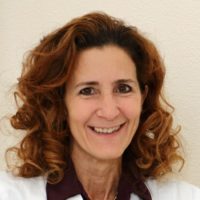
I have had experience in neuromuscular disorders both from a clinical and basic science point of view since the first years of Medical School, initially working in basic research regarding ion channel modulation in vitro using the patch-clamp technique. I have then switched to clinical research in ion channel disorders since the first years of residency. For the past 22 years I have been in charge of in-patients with muscle disorders at the University Department of Neurology in Milan and I have also been in charge of the State-run out-patient neuromuscular clinic at the Hospital Site. My main field of research has been the myotonic disorders, especially the myotonic dystrophies. Since 2010 I have worked as a CINCH site co-PI (International Consortium for Inherited Channelopathies), recruiting subjects for clinical studies. These clinical studies have given me experience in conducting clinical trials, in overcoming obstacles to patient recruitment and retention, in addressing challenges of drug supply, pursuing US, Italian and local regulatory approvals and working productively with clinical study groups. Since I became Clinical Director of the NEMO Center in 2013, I I have extended my field of research in other muscular dystrophies including Duchenne and Becker Muscular Dystrophy, Facioscapulohumeral Muscular Dystrophy (FSHD) and motor neuron diseases like Amyotrophic Lateral Sclerosis and pediatric and adult forms of Spinal Muscular Atrophy. Since 2019 I am the Scientific Director of the Nemo Clinical Research Center (CRC) at the NEMO Center in Milan, a dedicated university neurorehabilitation unit for neuromuscular patients and I am Faculty (Professor of Neurology) at the University of Milan since 2006.
Mauro Monforte
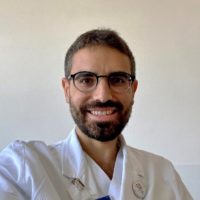
Dr. Mauro Monforte is a neurologist working at the Fondazione Policlinico Universitario A. Gemelli IRCCS in Rome, Italy. He received a PhD in neuroscience from the Catholic University of the Sacred Hearth in Rome, Italy, with a thesis on the “Use of muscle magnetic resonance (MR) imaging in Facioscapulohumeral muscular dystrophy (FSHD): pattern description, natural history definition and discovery of biomarkers of disease activity”. His research activity has been mainly focused on clinical, pathology and molecular aspects of neuromuscular disorders, and in particular he has been following families affected by FSHD since the very beginning of his career. In the last years, thanks to the participation to the COST Action BM1304 “Applications of MR imaging and spectroscopy techniques in neuromuscular disease: collaboration on outcome measures and pattern recognition for diagnostics and therapy development” he has also developed an increasing expertise in neuromuscular imaging.
Enzo Ricci
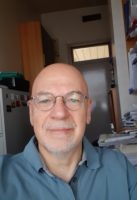
Prof. Enzo Ricci is a Neurologist and Associate Professor of Neurology at the Department of Neuroscience, Catholic University – Policlinico Agostino Gemelli in Rome.
Since 1983, his research has been focused on the clinical and diagnostic fields of neuromuscular disorders.
Since 1997 he has been involved in the field of clinical and molecular genetics of facioscapulohumeral muscular dystrophy (FSHD).
Since 2009 he has been the Scientific Director of FSHD Italian Association.
In the last 10 years Dr. Ricci has been involved in the field of muscle MRI in muscular disorders and especially in FSHD
Teresinha Evangelista

Dr Teresinha Evangelista is a Board certified neurologist and neuropathologist with long standing clinical and research expertise in neuromuscular disorders. Dr Teresinha Evangelista has over 20 years’ experience working as a Neurologist and later as a Consultant at the Neurosciences Department of the Hospital de Santa Maria in Lisbon. These roles have been completed in conjunction with research work as a member of the Neuromuscular Research Unit at the Institute of Molecular Medicine as well as has ab Invited Lecturer at the Faculty of Medicine at Lisbon University. After working in Paris, at the Unit 153 of INSERM (“Développement, Pathologie, Régénération du Système Neuromusculaire”) under the direction of Professor Michel Fardeau and having finish a post-graduation in Neuropathology has set a fully equipped Neuromuscular Laboratory at the Hospital de Santa Maria in Lisbon that became a Reference Laboratory for the South of Portugal. Dr Teresinha Evangelista played an important role in the development of a diagnostic network for Neuromuscular Diseases during the years working in Portugal and was appointed as President of the Portuguese Society for The Study of Neuromuscular Diseases in 2009. She works at present at the Unité de Morphologie Neuromusculaire; Institut de Myologie – Sorbonne Université, GHU Pitié-Salpêtrière. She is the coordinator of the ERN EURO-NMD since 2018 and co-coordinator from 2016 to 2017. Her work currently focuses on clinical and research work on hereditary muscle diseases, FSHD and Congenital Myasthenic Syndromes. Simultaneously as a member of the Joint Actions for rare diseases (EUCERD Joint Action and RD-Action), developed a particular interest in Rare Diseases policies.
Her work currently focuses on clinical and research work on hereditary muscle diseases, FSHD and Congenital Myasthenic Syndromes. Simultaneously as a member of the Joint Actions for rare diseases (EUCERD Joint Action and RD-Action), developed a particular interest in Rare Diseases policies. As a result of the policy work became responsible for the concept and setting up of the neuromuscular ERN (EURO-NMD) that integrates 61 healthcare providers from across Europe.
John Vissing
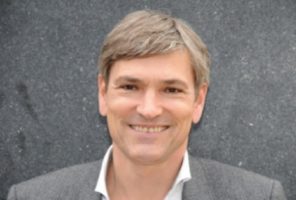
John Vissing is professor of Neurology at the University of Copenhagen, Denmark, and the Director of the Copenhagen Neuromuscular Center at the National Hospital, Rigshospitalet, in Copenhagen, with 38 dedicated neuromuscular employees. He obtained his MD in 1986 and was then a research fellow at University of Copenhagen and UT, Southwestern Medical Center in Dallas, USA. His research focuses on hereditary muscle diseases. Main research interests are treatment and pathophysiology of metabolic myopathies, FSHD and other muscular dystrophies, myasthenia gravis and channelopathies, discovery of new neuromuscular diseases, rehabilitation of muscle disease including exercise training, MR imaging of muscle, defining outcome measures for natural history and trials and unraveling genotype-phenotype relations in muscle disease. He has authored more than 400 scientific papers on neuromuscular diseases.
Benedikt Schoser
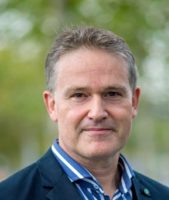
Professor Benedikt Schoser is senior consultant at the Friedrich-Baur Institute, Department of Neurology at the Ludwig-Maximilians-University of Munich, Germany.
Benedikt Schoser trained as a neurologist and intensive care neurologist at the universities of Mainz, Frankfurt and Hamburg in Germany. He completed his MD thesis on muscle denervation. Later, he worked as a postdoctoral research fellow in the channelopathy laboratory at the Center of Molecular Neuroscience in Hamburg. In 2001 he joined the Friedrich-Baur Institute at the LMU Munich and completed his habilitation on the caveolinopathy rippling muscle disease as professor of neurology in 2004.
He is coordinator of the diagnostic working group within the German MD-NET and member of the German reference group for neuromuscular disorders. He is chair of the neuromuscular panel at the German Neurologist society, and member of the muscle and neuromuscular junction and education panel of the European academy of Neurology, and he is organizing the World muscle society teaching course.
Benedikt Schoser has a long-standing interest in the pathogenesis and histopathology of muscular dystrophies, myotonic dystrophies and metabolic myopathies. Within the neuromuscular research group at Friedrich-Baur Institute he is engaged in all types of morphological and biochemical analyses including animal models. He has a special interest in translational therapy of muscular dystrophies, myotonic dystrophies, and glycogen storage disorders.
Federica Montagnese
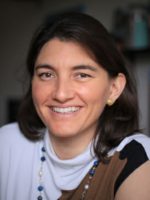
Dr. med. Federica Montagnese qualified as MD and Neurologist at the University of Messina, Italy. Since 2017, she has worked as a postdoctoral fellow at the Friedrich-Baur Institute, Department of Neurology, Ludwig-Maximilian University Munich, Germany. Here, she obtained certification as a neurophysiologist and works in the neuromuscular outpatient clinic. Her main research interests focus on the clinical and myopathological aspects of metabolic myopathies, myotonic syndromes and muscular dystrophies. She is responsible for the maintenance of the National Registries for myotonic dystrophies and facio-scapulo-humeral muscular dystrophy. She is a member of the EAN Subspecialty Panels of “Neurogenetics” and “Muscle disorders”.
Adolfo López de Munaín Arregui
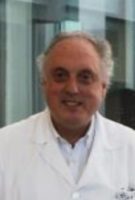
Dr. Adolfo López de Munain is a clinical neurologist who in addition to the main line in neuromuscular diseases, actively participated in the design and implementation of other lines of clinical and molecular research in neurodegenerative diseases. He is the author or co-author of more than 304 peer-reviewed articles, 40 book chapters and monographs and more than 400 communications in national and international congresses and invited papers. In this period, he has been the director of 20 doctoral thesis in some of the exposed lines. He has been principal investigator or collaborator in more than 41 R+D+i projects financed in competitive calls of Administrations or public and private entities. At the same time, he has 6 registered patents. On the other hand, he belongs to program 3 of CIBERNED, center of which since November 2020 he is the current Scientific Director. In addition to his career as a neurologist and biomedical researcher, Dr. López de Munain holds a degree in Historical Sciences and is an associate professor of Neurology at the University of the Basque Country.
Pilar Camaño González
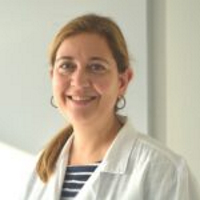
Pilar Camano is a biologist at the University of the Basque Country (UPV/EHU). In 2000, she began to work under the guidance of Dr. López de Munain, a neurologist at the OSI Donostialdea (Integrated Health Organisation) in the field of neuromuscular diseases, although she especially focused on the molecular diagnosis of the facioscapulohumeral muscular dystrophy (FSHD). In 2010 she continued her work at the Biodonostia Health Research Institute as Head of the Molecular Diagnosis Platform whose portfolio is oriented to neuromuscular diseases (for example, calpains) but especially to the FSHD. Throughout these 20 years, the techniques used in the laboratory have been adapted to be able to diagnose at a molecular level patients who arrive from different public and private centers throughout Spain since this is the only center in Spain that performs this molecular test. In these years, the molecular test for FSHD has been performed in more than 4,000 patients, with more than 2,000 patients being diagnosed with FSHD (FSHD1 and FSHD2).
Chris Turner
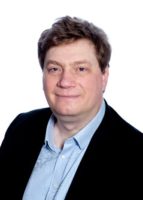
Dr Chris Turner graduated from Oxford University and undertook his clinical training in Oxford, Hammersmith Hospitals, the Whittington, St George’s, Chelsea and Westminster and the National Hospital for Neurology and Neurosurgery.
He was awarded a Wellcome Clinical Research Training Fellowship in 2000 and completed a PhD in the Molecular Pathogenesis of Huntington’s Disease.
In 2007 he became a consultant at the National Hospital for Neurology and Neurosurgery at the MRC Centre for Neuromuscular Diseases. Dr Turner runs neuromuscular clinics at Queen Square including those with FSHD.
He has a specialist interest in Myotonic Dystrophy and Chairs the National DM registry as well as leading the PHENODM1 natural history study with Grainne Gorman (Newcastle).
Dr Turner was appointed as Divisional Clinical Director of Queen Square Division in June 2018.
Enrico Bugiardini
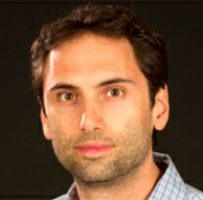
Dr Bugiardini completed his training in medicine and neurology at the University of Bologna and Milan, Italy. During his Neurology Residency training program, he developed a specific interest for neuromuscular diseases and has contributed to several research studies on myotonic dystrophies at the University of Milan. In 2013 he joined the Institute of Neurology, University College London (UCL) and completed a PhD on genetic basis of inherited myopathies and mitochondrial diseases.
His two main research interests are genetic investigations in neuromuscular diseases and clinical studies in Facioscapulohumeral muscular dystrophy (FSHD). The first aims to improve the current understanding of the genetic bases of inherited myopathies and mitochondrial diseases and their correlation with clinical manifestations. His approach combines deep phenotyping (including muscle MRI pattern analysis), next generation sequencing technologies (whole exome/genome sequencing) and functional studies.
His second area of research involves translational and clinical studies in FSHD, including validation of outcome measures, with the final aim to hasten drug development.
Dr Bugiardini also undertakes clinical activity in dedicated specialised clinics for Muscle Diseases and Mitochondrial Disorders at the Queen Square Centre for Neuromuscular Diseases in London.
Piraye Oflazer
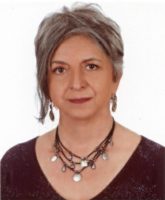
Piraye Oflazer M. D., is Visiting Professor of Neurology at the Koc University since 2017 and is founder and Director of the multidisciplinary Koc University Hospital Muscle Center since 2019. Dr. Oflazer actively takes care of patients with neuromuscular diseases within a multidisciplinary setting and performs/interprets muscle biopsies.
After having postdoc training at the University of Southern California Neuromuscular Center on muscle pathology, Dr. Oflazer became and served as a faculty at the Istanbul University Medical Faculty for 30 years, until 2014. Her work and research was dedicated to all neuromuscular diseases since then, although FSHD patient care and investigation has always been one of her prominent areas of interest. She was one of the founders of the Neuromuscular Department at the University of Istanbul and the founder and Director of the Neuromuscular Pathology Laboratory until 2014.
Dr. Oflazer was also dedicated to raise awareness in neuromuscular diseases among both physicians and patients within the country. She is a member and former moderator of the Neuromuscular Research Group of Turkish Neurological Association. She also was the Scientific Advisor of the Association Neuromuscular Disorders, Turkey during which she became President of European Alliance Of Muscular Dystrophy Associations (EAMDA) and then President of the World Alliance of Neuromuscular Diseases Associations (WANDA).
Jordi Díaz-Manera
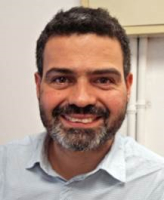
Jordi Díaz-Manera is working as a Professor of Neuromuscular Disorders at Newcastle University and as a Honorary Consultant Clinical Geneticist with the Newcastle Hospitals NHS Foundation Trust.
Jordi trained as an adult neurologist at the Hospital de la Santa Creu I Sant Pau (HSCSP) in Barcelona from 2001 to 2005. In 2006 he was appointed as Clinical Associate by the Neurology Department of HSCSP. He spent two years as a fellow in the laboratory of Giulio Cossu at the Stem Cell Research Institute of the Ospedalle San Rafaelle in Milano (Italy). His PhD was focused on the development of new diagnostic tools and therapies for Dysferlin Muscular dystrophy.
Jordi has a long-standing experience in translational clinical and basic research. His current clinical research projects are focused on the characterisation of a large cohort of patients with muscular dystrophies, the implementation of quantitative muscle MRI for the diagnosis and follow-up of patients with muscular diseases and the development of new outcome measures for clinical trials and natural history studies.
His basic research interest focuses on the process of muscle fiber degeneration and the replacement of muscle tissue by fat and fibrosis that takes place in patients with muscular dystrophies. He is especially interested in translating outcomes from cell biology experiments to the development of new therapies, and testing them in preclinical animal models of muscular dystrophies.
Jordi was the Coordinator of the Spanish Neuromuscular Research Group from 2012 to 2014 and member of the Executive Committee of the Catalan Society of Neurology from 2017 to 2019.
Ben Porter
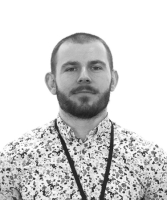
Ben joined the John Walton Muscular Dystrophy Research Centre in 2019 where he managed all aspects of the UK Myotonic Dystrophy (DM) and FSHD Patient Registries until the end of 2021. He has extensive networking experience, working closely with patient organisations, academics, clinicians and industry to support a range of research projects.
Previously, Ben has worked at the NIHR Innovation Observatory, supporting European and US-based companies through the early stages of the NICE Technology Appraisal process in England. In this role he developed a strong background in horizon scanning and evidence synthesis which he has brought to his current role to support the patient and research communities through the development of DM and FSHD drug development pipelines.
Ben has also helped support other neuromuscular projects in DMD, LGMD and MTM.